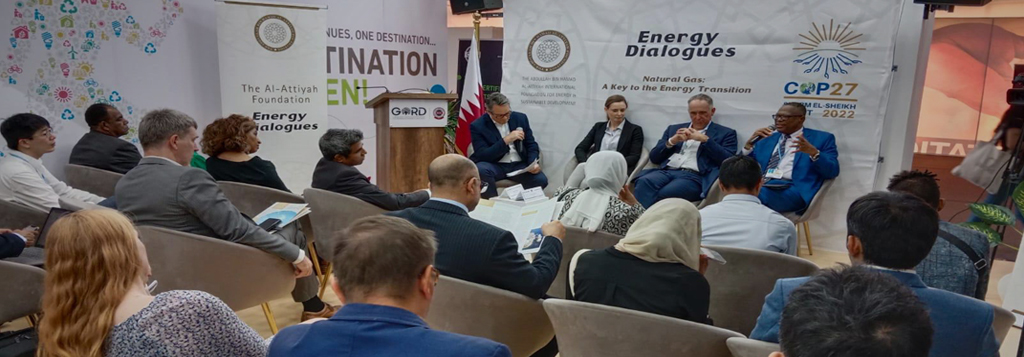The Al-Attiyah Foundation at COP27
 The Al-Attiyah Foundation at COP27
The Al-Attiyah Foundation at COP27
November 16th, 2022
The Al-Attiyah Foundation at COP27: Experts say natural gas has a big role to play in the world’s energy mix at a special event hosted by Qatar’s leading thinktank
Global experts examined the future of natural gas in the energy mix during an event hosted by the Al-Attiyah Foundation at the 2022 United Nations Climate Change Conference (COP27) in Sharm El Sheikh on 14 November.
This unique Energy Dialogue session, titled ‘Natural Gas - Does It Have a Role in the Energy Transition?’ featured the following panellists: Dr. Chris Gentle, Senior Advisor, Partnerships and New Ventures at the World Energy Council; Lorna Ritchie, Director at Global Counsel; and Dr. John Kilani, the Foundation’s Directorate of Sustainability.
The lively debate was moderated by the highly acclaimed broadcast journalist and Reuters Editor-at-Large, Axel Threlfall, and explored how natural gas has been replacing coal in societal functions such as electricity generation and space heating in the western world for decades.
It was highlighted that coal consumption in both the United States and United Kingdom has dropped significantly in recent years. Coal use in the U.S. is down by half from 15 years ago; 500 coal power plants have closed or are scheduled to and in 2021 coal consumption amounted to 10.8% of the country’s total energy consumption, the lowest amount since 1964.[1] Most of the lost U.S. coal capacity was replaced by natural gas, with additional contributions from renewables.
In the UK, the birthplace of the industrial revolution, coal-fired electricity has almost disappeared and now supplies only 5 percent of power.[2] In both countries, the replacement of coal by natural gas and renewables is reducing both CO2 emissions and air pollution from particulates, mercury, sulphur, and lead - saving lives as a result.
The panel observed that the implementation of the Paris Agreement is an evolutionary journey, that will involve big and small incremental steps. Increasing ambitions, in terms of the Paris Agreement requires a commitment to transform the way energy is produced, transported, and used globally; and the experts are of the view that natural gas has a major role to play in the push for energy transition. Also because of its versatility, natural gas, as the cleanest fossil fuel, has the best prospect for synergy with renewables, when compared to coal and oil.
Although natural gas produces less CO2 than coal, it still produces carbon pollution, and therefore slows, but does not solve, the climate problem. During the dialogue it was stressed that to meet targets set in the Paris Agreement, natural gas should be used in conjunction with low carbon technologies and that natural gas plants are carbon capture ready.
Electricity plants, of whatever fuel, are probably the best examples of where to install carbon capture. The carbon dioxide generated from electricity plants are usually concentrated in the post combustion phase of burning, making carbon capture feasible. However, the number of such plants utilising carbon capture worldwide, is still relatively small, only in the tens of thousands, and this needs to be addressed.
To keep up to date with the Foundation’s latest news and to learn more on the energy industry, be sure to visit our website (https://www.abhafoundation.org/) and follow us on Twitter @AlAttiyahFndn.
By: The Al-Attiyah Foundation